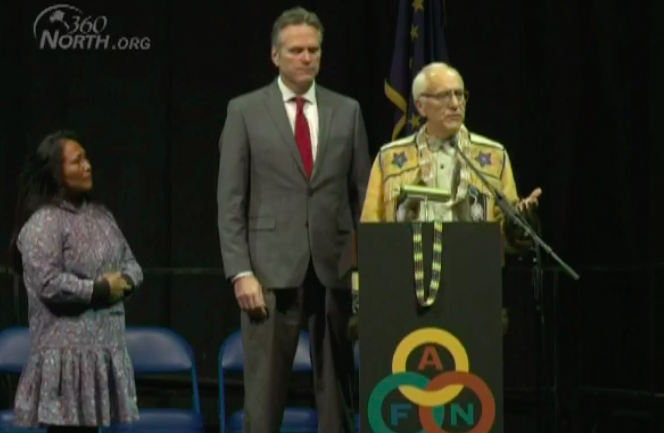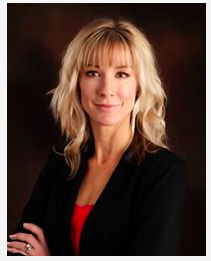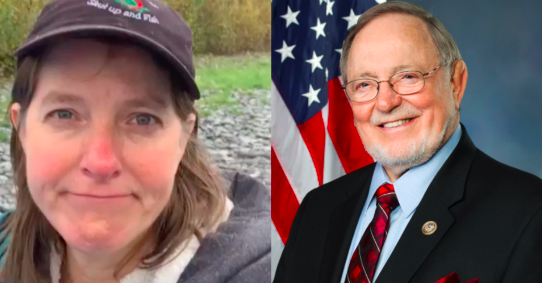UNPRECEDENTED BOOING, CHANTING, DRUMMING
The welcome that Gov. Michael Dunleavy received at AFN was so rude that finally Alaska Federation of Natives Convention Co-Chair Will Mayo came back up to the stage, interrupted the governor during his speech, and scolded the protesters into desisting.
But they had achieved their goal of taking away his time on stage, drowning him out, and making their protest the news story of the day. It was “mission accomplished” for the Recall Dunleavy campaign, which has a booth in the convention hallway.
The booing began before the governor even reached the microphone. He soldiered on through his remarks, as members of the audience rose, raised their fists, and turned their backs on him, while others held “Recall Dunleavy” signs. Then the chanting began, and the drums.
It was unprecedented. No governor in Alaska has ever been treated this way at the Alaska Federation of Natives annual convention. And it was ironic, as the most spoken word at the microphone in the morning was “Welcome.”
Dunleavy continued to speak, trying to ignore the disruption. He was talking about how his administration was focusing on solving cold cases, including those of murdered Native women. He was talking about clearing the backlog of rape kits. He was taking about recruiting more troopers and village public safety officers for rural communities. But his concentration was clearly affected, and he wasn’t heard by the audience over the protests. His wife, Rose Dunleavy, stood nearby him, her hands in a knot.

Mayo finally had to step up and intervene. He reminded the audience that Dunleavy was their guest and that it’s the Native way to treat guests with respect.
“When we gather together and we invite somebody into our house we do it out of respect and we do it with kindness in the native way,” Mayo admonished.
“I respect your right to protest … I am going to ask you with respect to please express your views at the voting booth, express your beliefs in a constructive way and don’t come into our house and disrespect our guest,” he said. The majority of the audience applauded Mayo’s remarks.
Mayo continued: “Governor, we asked you and invited you to come. We asked you from a good heart. We are not here to attack you. We may express differences. We would like to ask you to continue your address.”
The crowd settled and was mainly non-disruptive during the rest of Dunleavy’s remarks, although loud talking continued.
After the governor concluded to polite applause, Rose Dunleavy presented the Shirley Demientieff Award to the “Coaching Boys into Men” program in Kake. But she appeared shaken, and soldiered through her presentation, clearly upset by the AFN treatment of her husband of 31 years, the father of her children. The entire presentation ceremony featured a video that focused on the theme of teaching young people “respect.”
Julie Kitka, executive director of AFN, then thanked the governor and first lady, and gave them courtesy gifts, in the tradition of AFN. But she, as the leader of the statewide organization, did not apologize for their treatment or her management of the convention.
It was well-known for days in advance that there would be a major disruption , and Kitka took no responsibility for not providing a courteous and safe environment.
Afterward, Aaron Schutt, president and CEO of Doyon, the Alaska Regional Native Corporation in the Interior, rose to admonish the protesters: “In no case should there ever be disrespect of our guests or disrespect of each other.”
Chief Victor Joseph of Tanana Chiefs Conference then took the microphone and apologized to the governor and first lady.
“As leaders of the Interior, when Will Mayo came up to say his strong words, I felt the need to come up and stand beside him. As our elders taught us, they taught us respect, how to treat our guests. Whether we like him or not, whether I agree with or not, we always treat people in good way. That didn’t happen today. From me to our governor and first lady, I apologize.”








